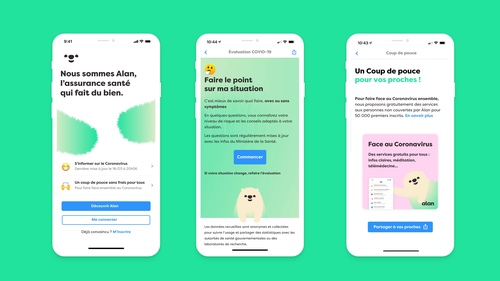Une start-up en pleine croissance
La crise sanitaire n’a visiblement pas impacté l’assurtech Alan, dont la croissance a atteint les 105 % en 2020, année qui lui a permis de générer 90 millions d’euros de revenus.
Né il y a moins de 5 ans, l’assureur santé en ligne compte déjà 155 000 assurés et 9000 entreprises dans son portefeuille clients. Entre janvier 2020 et janvier 2021, la jeune pousse est passée de 160 à 274 salariés.
Jean-Charles Samuelian, son cofondateur et PDG, la définit comme une entreprise de santé, mais considère l’assurance comme une seule partie de l’offre. À terme, la start-up entend bien faire de son application un outil indispensable à la gestion quotidienne de la santé des utilisateurs, et offrir la possibilité d’organiser l’ensemble du parcours de soin.
Sa récente levée de fonds, d’un montant de 185 millions d’euros, lui a permis de valoriser son capital à 1,4 milliard d’euros. Alan acquiert ainsi le statut de « licorne », et rejoint les 11 autres start-ups françaises valorisées à plus d’1 milliard de dollars, parmi lesquelles on trouve notamment Blablacar, Doctolib, ContentSquare, Kyriba et Mirakl.
Alan, une culture d’entreprise singulière
Chez Alan, les recrutements ne sont pas basés sur les diplômes des candidats, qui sont « interviewés » par un panel représentatif de l’entreprise. Les dirigeants ne sont donc pas les seuls à décider lorsqu’il est question d’agrandir l’équipe.
Le recrutement se fait en 4 temps. Le premier entretien, relativement classique, consiste à décrire le poste visé et à écouter les motivations du candidat. Le deuxième entretien, technique, est suivi d’un troisième entretien, au cours duquel les valeurs et les expériences du candidat sont au centre de l’attention.
Enfin, la quatrième et dernière étape n’est pas un entretien, mais une immersion d’une journée dans les bureaux de l’entreprise, qui permet aussi bien au candidat qu’aux recruteurs de confirmer ou non leurs premières impressions.
Alan mène une politique volontariste pour participer à la féminisation du secteur de la tech, sans toutefois vouloir s’engager dans des procédés de discrimination positive.
Les réunions, considérées comme chronophages et peu efficaces, sont remplacées par des discussions virtuelles auquel chacun participe quand il en a le temps.
Par ailleurs, tous les salariés sont associés au développement de l’entreprise. Au bout de 2 ans passés au sein de la start-up, ils peuvent choisir de revendre 5 % de leurs parts à l’occasion de levées de fonds. Sur les 185 millions d’euros obtenus lors de la dernière levée de fonds, 35 millions ont servi à racheter les actions des premiers investisseurs et de 12 salariés.
